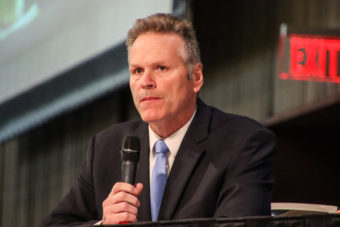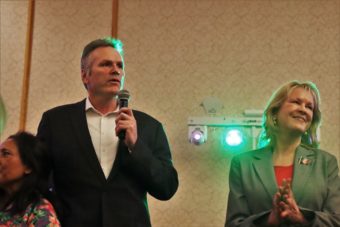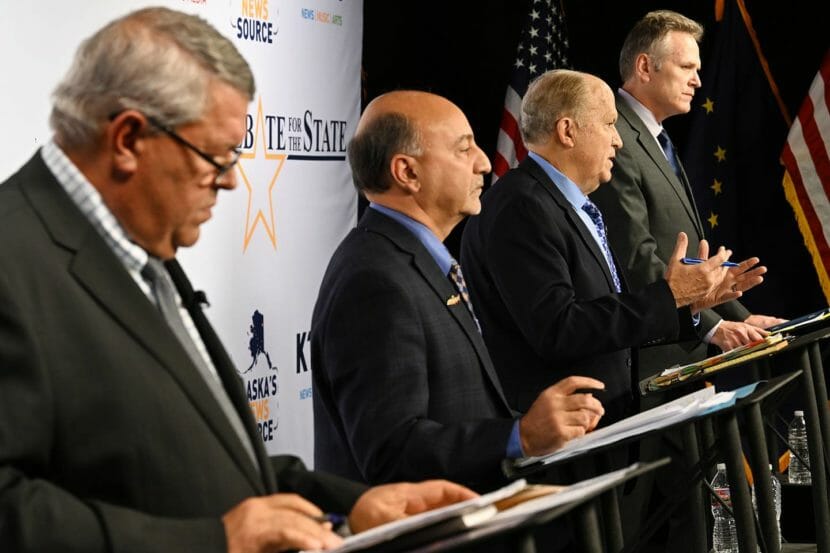
Alaska’s four candidates for governor sparred over crime, education, abortion access and the state budget Wednesday night in the only live televised debate ahead of the November election.
Independent former Gov. Bill Walker and Democratic former state lawmaker Les Gara devoted much of their responses to attacking Republican incumbent Gov. Mike Dunleavy for his record. Meanwhile, Dunleavy and fellow Republican candidate Charlie Pierce, former mayor of the Kenai Peninsula Borough, appeared to agree on most issues and urged their supporters to rank the other candidate second in the state’s first ranked choice general election.
Walker and Gara’s attacks centered on Dunleavy’s record of slashing state spending on services and failing to advance a fiscal plan to provide a dependable calculation for the Permanent Fund dividend and covering the cost of running state programs such as education.
The debate came a day after expected news broke that the Anchorage School District is considering closing six elementary schools in light of budget shortfalls, after the per-student state funding formula increased by only 0.5% since 2017, far below the 15% rate of inflation in the same time frame.
Gara blamed Dunleavy for creating what he called “the worst crisis in Alaska history” and argued in favor of providing teachers with a pension program to make the state more competitive in attracting teachers. Walker said the state should “fully fund education and make it the priority that it used to be.”
Dunleavy met the criticism by pinning school districts’ budget shortfalls — including the one in Anchorage — on district budget management.
“I’d be more than happy to sit down with a number of these school districts,” Dunleavy said, “and have a discussion as to why they are short on their budgets.”
Dunleavy painted a rosy picture of the state, saying Alaska crime is lower than before his tenure, the operating budget has been reduced, the dividend this year is one of the highest ever, and state debts this year were paid off.
Walker and Gara had a more grim picture in mind. While crime may be lower, key crime statistics still put Alaska as the most dangerous state for women; the larger dividend and debt payoffs this year were only possible thanks to temporarily high oil prices; and the state still lacks a fiscal plan to create long-term stability for services like education, they said.
The Permanent Fund dividend
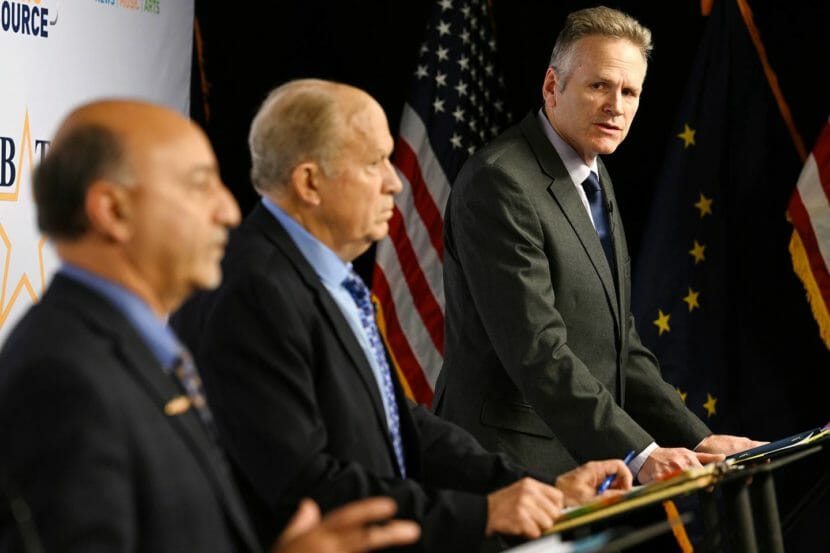
Dunleavy touted the dividend payments this year — one of the largest sums in the state’s history — as a victory. But his opponents pointed out that the dividend amount and the state savings that Dunleavy also touted were only possible due to higher oil prices largely driven in part by Russia’s war in Ukraine.
Gara promised to solve Alaska’s budget challenges by doing away with $1.2 billion in subsidies to oil companies — a promise that has been fundamental to his campaign. Gara said by doing that, the state would be able to afford a dividend and full funding of schools, including indexing the per-student funding formula to match inflation, which Gara said is necessary.
Walker said the formula used to calculate the dividend should be changed but didn’t commit to a particular path, instead saying he would work with the Legislature to come up with an alternate calculation and a fiscal plan for the state.
“With a high dividend, right now we’ve been put on the express lane for high taxes in Alaska, and that’s what I don’t want,” Walker said.
[Compare candidates for Alaska governor’s positions issue-by-issue]
Dunleavy also said he favored a new dividend formula, and also a constitutional spending limit that would put guardrails on the state’s expenses for services.
Dunleavy blamed Walker for “breaking” the dividend formula under his term as governor, referring to a 2016 decision by Walker to veto part of the dividend in order to cover the cost of state services in light of a multibillion-dollar budget deficit. Dunleavy, as a state senator, voted at the time in favor of the smaller dividend.
Pierce called the dividend “an Alaskan right” and called for the existing statutory formula to be followed or holding a constitutional convention to retool the formula.
Abortion
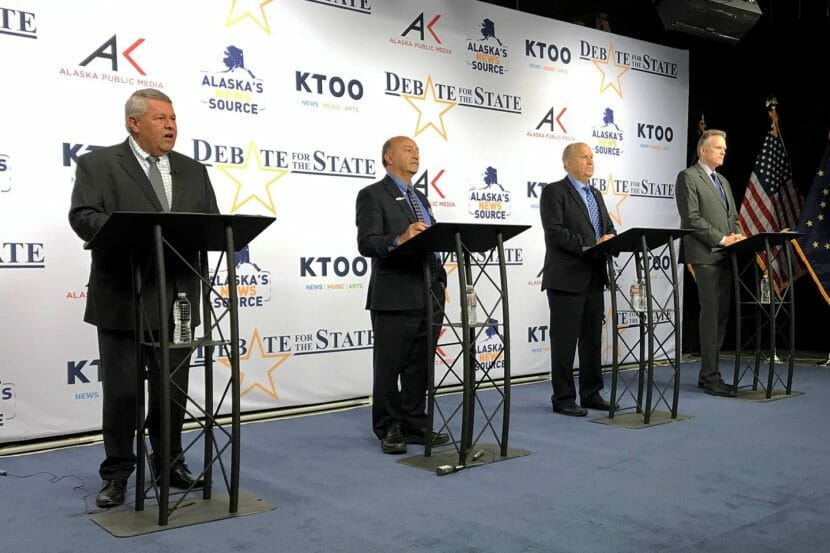
Asked about abortion access, Gara said he is the “only pro-choice candidate” in the race. The question has become a sticking point for Gara and Walker as they try to court voters for whom abortion has become a key issue after the U.S. Supreme Court this year did away with federal protections for accessing the procedure.
Gara is the only candidate in the race endorsed by Planned Parenthood. Walker, who has called himself “pro-life,” promised he would maintain the protections for abortion access currently guaranteed under Alaska’s state constitution. He said he would veto any legislation “that comes between a woman and her doctor.”
Dunleavy tried to sidestep the issue, accusing Walker and Gara of “fear mongering.” But Dunleavy is already on the record as opposing abortion access. After the Supreme Court’s decision overturning federal constitutional protections for abortion, he called for a vote on an amendment to the state constitution to remove statewide protections for the procedure. Ahead of the 2018 gubernatorial election, Dunleavy said he opposed abortion access in all cases, including in cases of rape and incest.
Dunleavy also gave an evasive answer when asked about the treatment of “marginalized students” in light of a policy implemented in the Matanuska-Susitna Borough targeting transgender students.
Dunleavy said “there will be no discrimination” and “hasn’t been” discrimination under his administration. Earlier this year, Alaska under Dunleavy’s administration joined a lawsuit against the U.S. Department of Agriculture over a rule that would cut federal meal funding for schools that don’t include LGBT-friendly policies.
Both Walker and Gara said they would work to protect LGBT students. Pierce expressed support for the Mat-Su policy that banned transgender students from using bathrooms and locker rooms that match their gender identity.
“The last thing I’d ever want to do as a governor is discriminate against an individual and their rights to choose,” Pierce said, moments after he said he is opposed to abortion access and would favor a vote on changing the state’s constitution to allow for abortion bans.
Crime
Asked about Alaska’s high rate of violence against women, Dunleavy responded by saying the rate of rape had gone down by 6% in a single year. That is inaccurate. The rate of rape has gone down by that percentage between 2018 and 2021, from 1,188 to 1,115. Alaska’s rate of rape remains significantly above the national average.
While Dunleavy has touted his record on reducing violent crime in the state during his tenure, critics and experts on criminal justice have pointed to the Alaska’s rate of violence against women, which remains shockingly high when compared to the rest of the country.
“The long term trend for rates of rapes, no matter how it’s measured in the state of Alaska, is that it is very much higher than the national average,” Troy Payne, an associate professor at the UAA Justice Center, said this month. “And it’s not by a little bit, it’s by a whole lot. Quite frequently it’s by a factor of two or more. So, that is an important part of any story where you’re trying to describe what’s going on in the past year or two.”
Both Gara and Walker attacked Dunleavy for Alaska’s high crime rate and the continued lack of policing in some rural communities — problems that predate Dunleavy’s tenure but have remained largely unchanged under his leadership.
Dunleavy sidesteps
As he did on the question of abortion, Dunleavy tried to evade providing details on his positions on the constitutional convention and ranked choice voting. In both cases, Dunleavy said the question should be left to voters, rather than providing his own position.
“The people put this into law so we have to respect that,” Dunleavy said on ranked choice voting. One of Dunleavy’s closest advisers, Brett Huber, ran the campaign opposing ranked choice voting before it was narrowly adopted by voters in 2020.
“I think people should decide what they want to do and not listen to the fear mongering being paid for out of Washington, D.C.,” Dunleavy said on the constitutional convention, referring to Outside funds raised by a group opposing the convention. Dunleavy’s comment is noteworthy because his own campaign is boosted by millions in Outside funds, including $3 million from the Washington-based Republican Governors Association.
At a recent candidate forum hosted by a resource development group, Dunleavy indicated he supports holding a constitutional convention and that he opposes Alaska’s new ranked choice voting laws.
Pierce, the other Republican in the race, was more overt in his answers, saying he is in favor of a constitutional convention and opposes ranked choice voting. He questioned whether the ballot initiative that implemented ranked choice voting “passed legitimately.” The election was audited, confirming it had passed.
“I think it’s clear that the people in Alaska have been ignored by their elected officials and I think that’s a good reason to have the constitutional convention,” Pierce said, citing abortion access limits, judicial selection reform, a new dividend formula and a state spending cap as issues he would like the convention to consider.
Gara and Walker both said they support ranked choice voting and oppose a constitutional convention.
The two have discussed their views on the issues at several of more than a dozen debates they have attended, many of which were snubbed by Dunleavy and Pierce. All four candidates are expected to meet again Saturday for another debate at the Alaska Federation of Natives Convention in Anchorage.
Daily News reporter Sean Maguire contributed.
This story originally appeared in the Anchorage Daily News and is republished here with permission.

